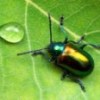Here's an example of the power of evolutionary theory. Suefuji et al just published a paper in Biology Letters describing the relationship between the number of queens in an ant nest and the rearing of new reproductives. That'd be a cool enough paper on its own, but there's more. Evolutionary theory makes some specific predictions about when sexuals ought to be produced under different numbers of queens. If the selfish-gene hypotheses of evolution are true, then nests with multiple queens should race to produce sexual brood earlier than nests with single queens. And that is exactly what Suefuji et al find.
Abstract: Wingless males of the ant genus Cardiocondyla engage in fatal fighting for access to female sexual nestmates. Older, heavily sclerotized males are usually capable of eliminating all younger rivals, whose cuticle is still soft. In Cardiocondyla sp. A, this type of local mate competition (LMC) has turned the standard pattern of brood production of social insects upside down, in that mother queens in multiqueen colonies produce extremely long-lived sons very early in the life cycle of the colony. Here, we investigated the emergence pattern of sexuals in two species with LMC, in which males are much less long-lived. Queens of Cardiocondyla obscurior and Cardiocondyla minutior reared their first sons significantly earlier in multi-queen than in single-queen societies. In addition, first female sexuals also emerged earlier in multi-queen colonies, so that early males had mating opportunities. Hence, the timing of sexual production appears to be well predicted by evolutionary theory, in particular by local mate and queenâqueen competition.
source: Suefuji, M., Cremer, S., Oetller, J., and Heinze, J. 2008. Queen number influences the timing of the sexual production in colonies of Cardiocondyla ants. Biology Letters, doi:10.1098/rsbl.2008.0355.
